When we arrive in the small Bedouin community of Al Farisiya in the heat of the morning sun, we get a wave from one of the teenagers in the family we’re visiting from under a tree. He starts to arrange the chairs for us, and we join him in the welcome shade. At just 15, Mazen is already a skilled and knowledgeable shepherd, although his older brother, father and uncles take the lead when out with their flocks. The risk of settler violence whilst out shepherding and now also directly inside the community, and even inside the home is high.
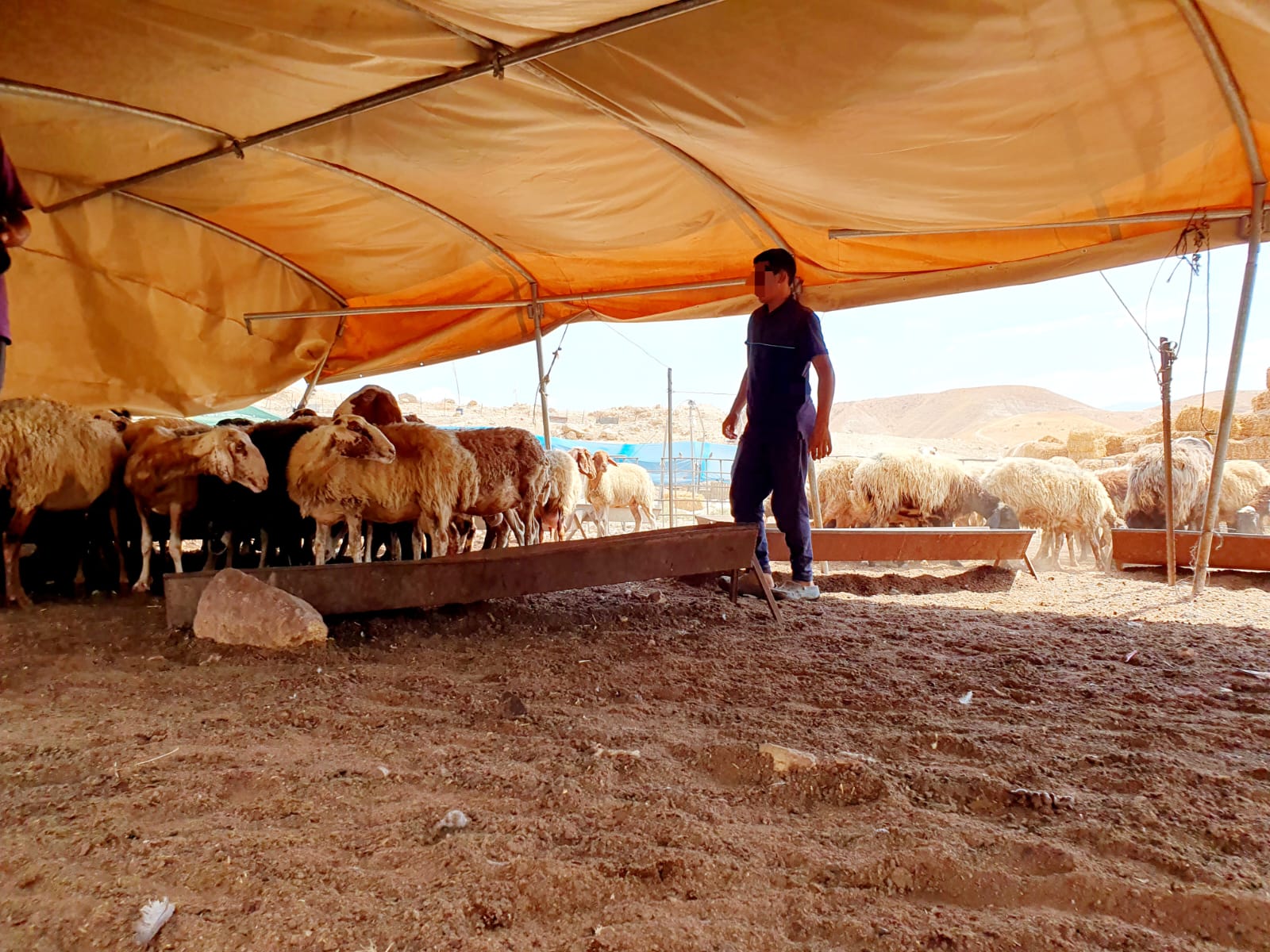
Mazen with his sheep in Al Farisiya
Al Farisiya is located in the Jordan Valley; a lush and historical stretch of land in the West Bank that runs from the Dead Sea up to the village of Bardala in the north. The entire valley lies well below sea level between the Jordanian border and a mountain ridge to the west creating a diverse landscape. The area is home to many sites of historical or religious importance such as the Baptism Site and Tell es-Sultan.
The Jordan Valley has a warm climate and is rich in fertile land and abundant water sources, offering great economic prospects and rendering the area politically significant. Palestinian access to and from the Jordan Valley area is highly constrained by dozens of Israeli military checkpoints, roadblocks, fences and trenches that impede access of Palestinians to grazing land, services, markets for agricultural produce, and undermine family and social ties. The first six Israeli settlements in the area were built in the three years following the Six Day War in 1967, and the network of illegal settlements has expanded to at least 37 in the decades since.
Additionally, in recent years, settlers have built dozens of outposts near many shepherding communities like Al Farisiya. Outposts are dwellings established ‘unofficially’ by ideological settlers on Palestinian land. Though outside of planning laws, they receive military protection and financial assistance from the Israeli government and are connected to Israel’s main electricity and water supply, and access roads. The vast majority are retroactively legalised by Israel and become permanent.
Violent attacks from ideological settlers have become a terrifying daily routine, include settlers driving Palestinian shepherds and farmers out of pasturelands and agricultural fields, physically assaulting community members, entering people’s homes in the middle of the night, setting fire to Palestinian property, scaring livestock, destroying crops, theft and road closures. Palestinian residents have also reported physical restrictions on water access as well as settler flocks regularly being led to drink in Palestinian water reservoirs.
This community currently have a 24/7 presence of Israeli peace activists to try and reduce the impacts of the harassment and violence that they face.
‘Even here sitting in your house you are not safe… We are stressed all the time.’
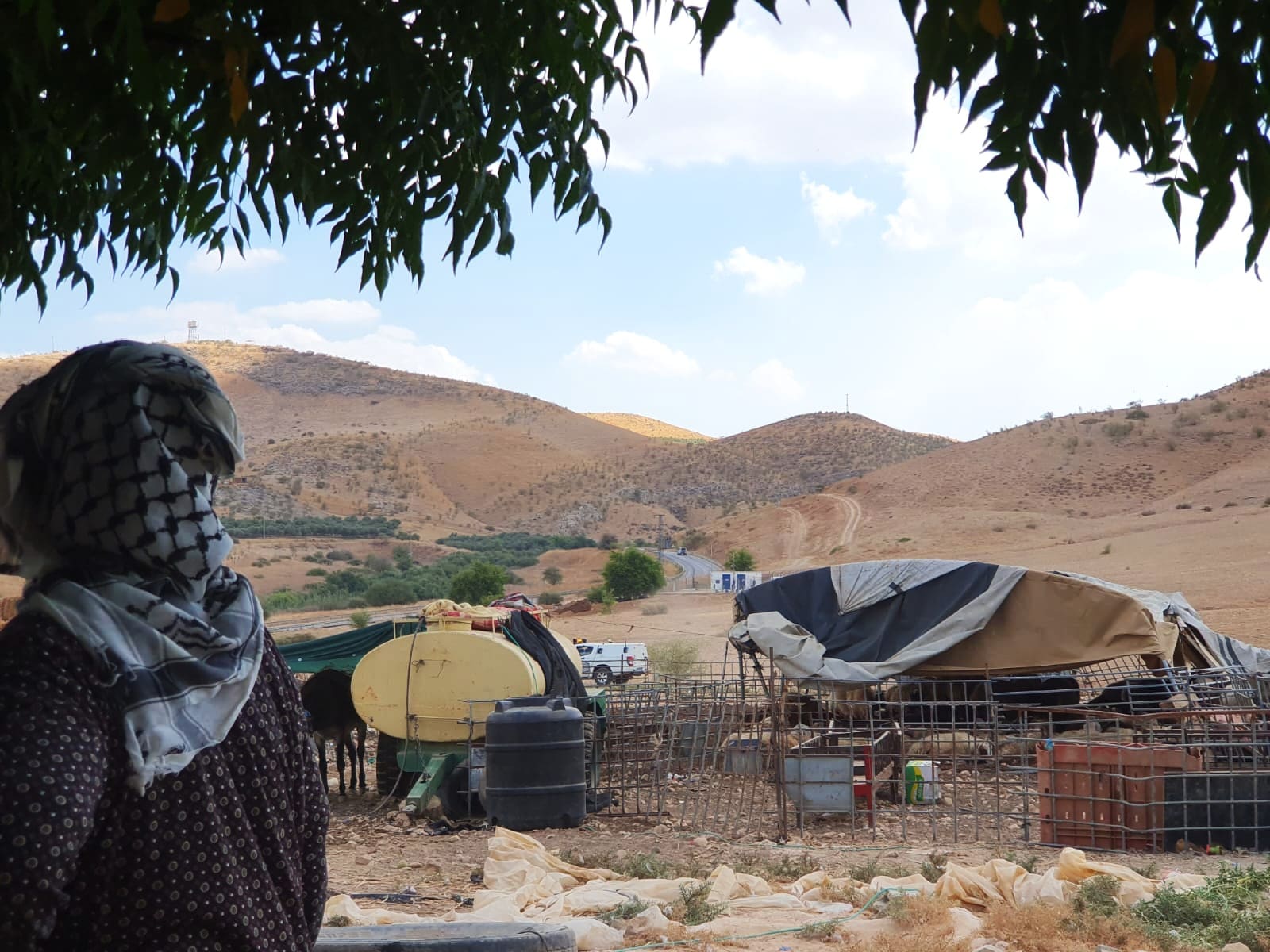
Family in Al-Farisiya look on as the Israeli military leave the village following one of their regular visits
After initial greetings, Mazen starts to tell us about an incident from a few days before when armed settlers came and attempted to steal the family’s entire flock of sheep. His uncle Loay joins us with a look of hopelessness on his face and a shrug of his shoulders as he sits down. He shakes his head.
‘I swear to God this is a troubled life and we are thinking of selling the sheep. We never imagined it could be like this and we would be thinking this way. The taste of life is now very bitter.’
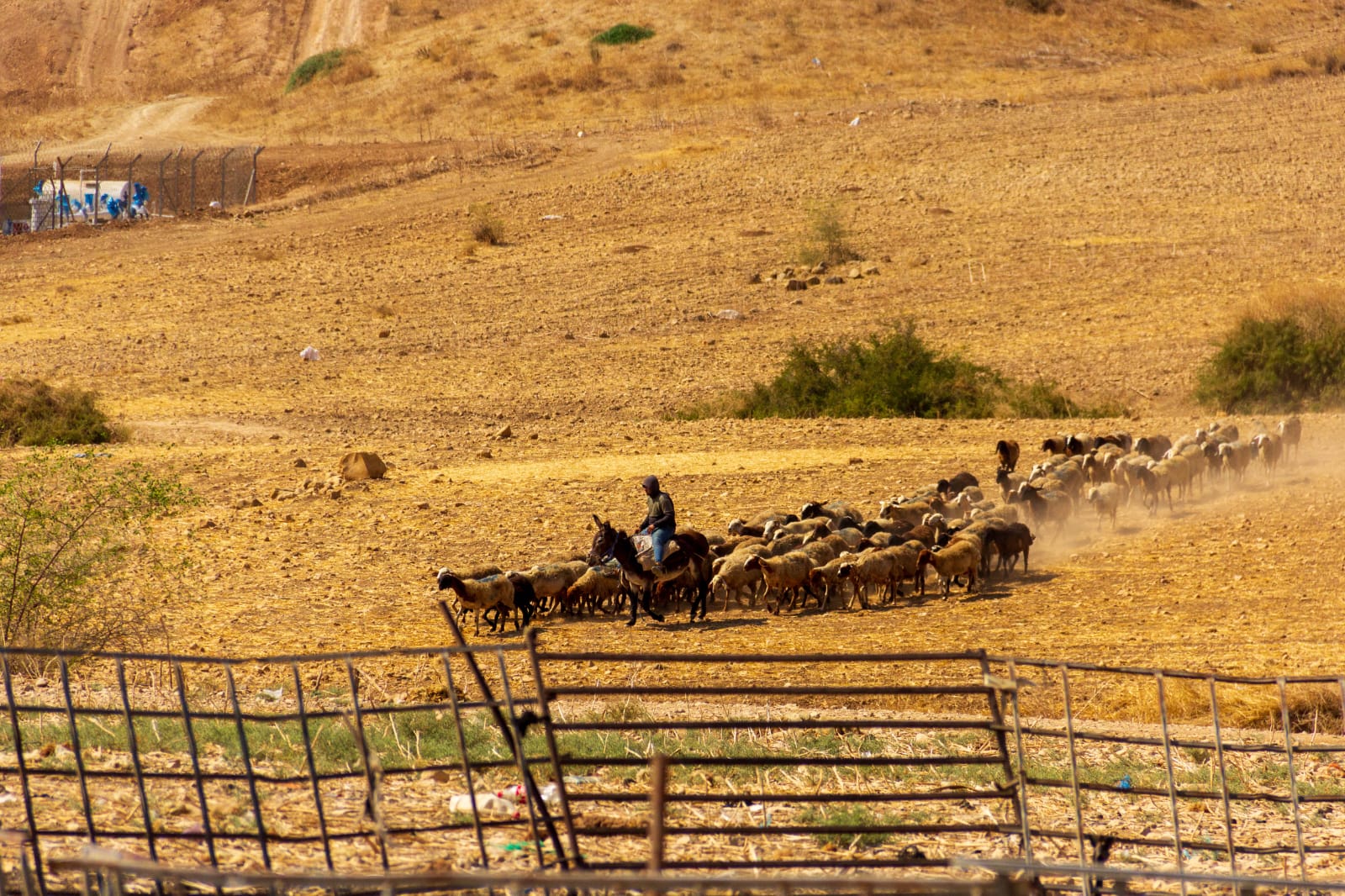
A young shepherd in Al-Farisiya brings his sheep back from morning exercise close to their home
Selling milk, cheese and meat from sheep, goats (and in some cases cows), is the main source of income for most of the shepherding communities in the Jordan Valley, and the only source of income for some. Due to the restrictions on grazing pastures enforced by the Israeli military and by settler violence (including direct attacks and burning of land), many shepherds are being forced to buy large quantities of fodder and water for their sheep to be able to survive. This cost is making the business for many unviable. In addition to this, there has been a notable increase in settler attacks where livestock are stolen from Palestinians.
‘My only income is my sheep: If they steal our sheep, we will have nothing..’
Mazen’s family were ‘lucky’ on this occasion; they managed to get their sheep back with the help of Israeli peace activists, but the incident has clearly had an impact on their outlook. Additionally, the news has reached all the communities in the Jordan Valley by now that a few days ago, another shepherd closer to Jericho was not so lucky. He had roughly 300 sheep stolen from him by around 15 settlers, some of whom shot at him with live rounds during the incident. The flock was the entire income for four families.
‘We are here because of the sheep, it makes me sick how they can take my sheep, my work, my life in front of my eyes, in one hour they can take everything, and I can’t do anything.‘
Mazen’s father Mourad has joined us too. Mourad can be a bit of a joker at times but today he is serious:
‘I will be lying to say we are not scared to stay here…It is clear that they [the settlers] want us to leave or die.’
Even though the shepherding community in the Jordan Valley has been facing challenges from settler violence and land restrictions by the military over many years, Loay has shared with us that the increase in violence since the current war in Gaza started following the events of October 7th, has been stark. In most of the communities, the sheep are only ‘allowed’ to move in very close proximity to the homes and even then, this is for exercise purposes only:
‘If you think about how life used to be and what it is now, it will drive you completely crazy. Before, we could go out for hours. The sheep could wander wherever they need. Today we are forced to only be inside our house and even still you don’t feel safe.’
He tells us that it is hard to think about what life was like before.
‘The places we used to shepherd for grazing have all been taken over by settlers.‘
He is not the only shepherd we have heard talking like this. In a nearby hamlet, a day or two before, Nayef told us:
‘I sometimes stand under the tree and look out at the land. Looking at places I used to shepherd but cannot go anymore. I have been shepherding this area since I was 14 years old. It hurts me a lot. It is too heavy for us to carry – only God gives us strength.‘
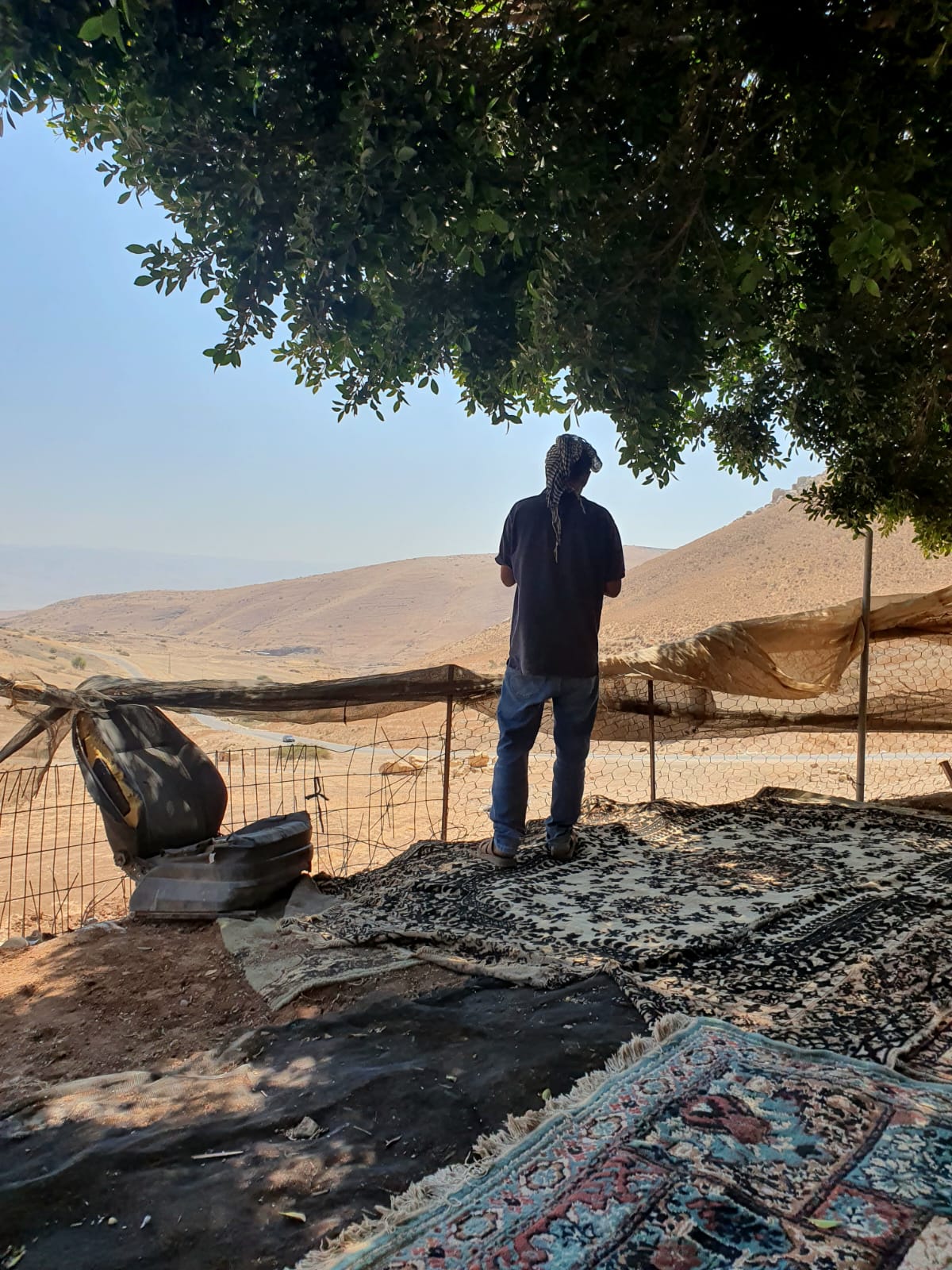
Al Bourj – shepherd looks out at pastureland he used to graze freely on
And Ayman a little further south:
‘You might laugh but sometimes in my dreams, I swear I see the land we are no longer allowed to go on. I grew up walking this land.’
Across all the shepherding communities we have met in the Jordan Valley, one thing is clear. They are all living in extreme stress:
‘We don’t sleep well; we know they [the settlers] can attack at any time.’
‘Every morning when we wake up, we check ourselves to see if we are alive.’
‘Every day we survive, we thank God we survived today but we don’t know what tomorrow will bring.‘
‘It is hard to imagine four years ahead, we don’t know what will happen in the next hour.‘
‘You never know when you leave the house if you will make it back alive.‘
The long-term impact of living a life where you feel unsafe, threatened and awaiting attack at all times is not to be underestimated. With new outposts in the area in recent weeks and more families being forced to flee, the pressure is on these families now more than ever.
‘If you stay alone for two days you will have serious psychological problems. We already have. It doesn’t feel like there is any colour to life.’
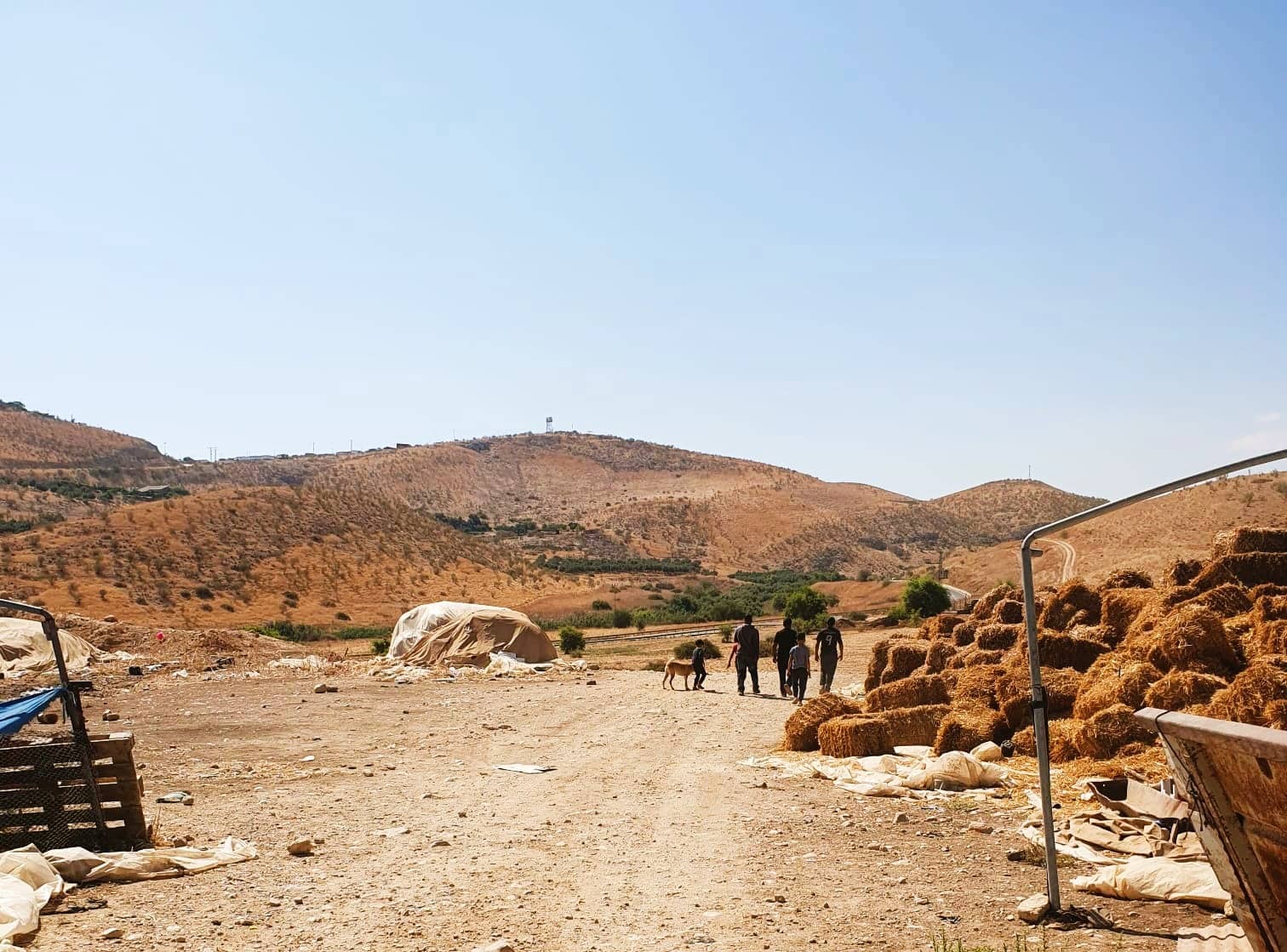
Shepherds go to check why dogs are barking and if settlers are approaching
‘They want us to leave from here, that is what they want.‘
Human Rights Watch reported in April this year that the Israeli military either failed to protect Palestinians from violent settler attacks or actively took part in attacks in the West Bank that displaced people from 20 communities and entirely uprooted at least 7 communities since the war in Gaza began on 7 October, 2023. The UN documented that since this time, at least 1,222 Palestinian people in the West Bank, including 595 children, have been displaced due to settler violence and land access restrictions.
Settler violence, and the systematic failure to protect Palestinians from it, is one method employed in support of the Israeli governments ‘defined strategic goal’ to take over land according to Israeli human rights organisation B’Tselem;
‘The violence has robbed Palestinian residents of their ability to continue earning a living. It has terrorized them to the point of fearing for their lives and made them internalize the understanding that there is no one to protect them. This reality has left these communities with no other choice, and several of them have uprooted themselves, leaving hearth and home for safer places.’
In 2019, Netanyahu announced his intention to ‘to apply Israeli sovereignty to the Jordan Valley and the northern Dead Sea’ which many viewed as a vow to annex the area (totalling about 30% of the West Bank). According to StandWithUs, supporters of applying Israeli sovereignty in the Jordan Valley argue that the territory is essential to Israel’s security.
Jordan Valley shepherds:
‘We don’t want anything except a peaceful life.‘
‘It’s every day, we don’t see any solution, any hope.‘
‘If people don’t care about all the people who die in Gaza, they are not going to care about us and our suffering. They’re just killing us here more slowly.’
Without any clear path to resist these forced expulsions, some communities are losing hope – and your solidarity is urgently needed. In July, the International Court of Justice ruled that the Israeli occupation of Palestine is illegal. This historic ruling outlaws Israel’s 56-year-long military rule over millions of Palestinians, including the building of settlements. Join us in calling on elected representatives and faith leaders to urgently and unequivocally support the findings of the court:
Take action!
-
Sign and share our urgent action on the ICJ’s Palestine ruling! In the UK? Sign here. In Ireland? Sign here.
-
Visit our action page to keep up to date with our other campaigns, subscribe for updates and follow us on social media.
What does international law say?

